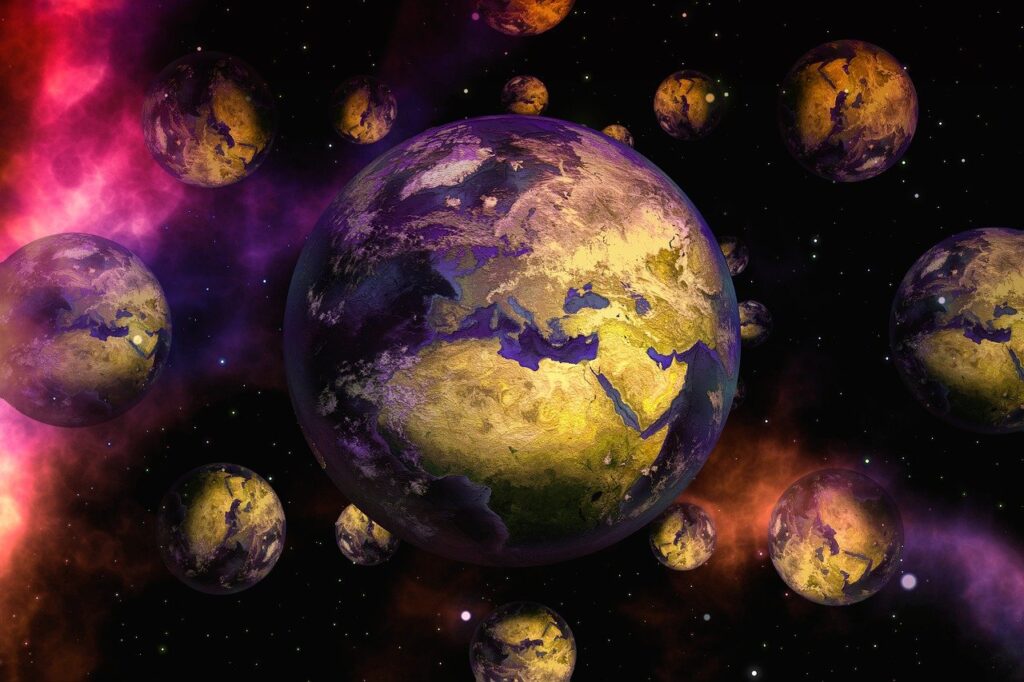
The concept of the multiverse, a theoretical construct featuring an array of parallel universes, each with its own distinct set of physical laws and possibilities, has fascinated the minds of scientists, philosophers, and science fiction enthusiasts for decades.
This intriguing notion has given rise to a rich tapestry of non-fiction literature, each offering interesting insights into the complexities of the multiverse. In this article, we’ll explore the top 10 non-fiction books that delve deep into the multiverse, providing in-depth and mind-expanding perspectives on this wonderful but complex topic.
Related:10 Must-Read Books About Parallel Universes, Top 10 Best Astronomy & Space Books
So, let’s start. Hope you’ll enjoy those books:
“The Hidden Reality: Parallel Universes and the Deep Laws of the Cosmos” by Brian Greene
In “The Hidden Reality,” the renowned physicist Brian Greene masterfully unravels the perplexing notion of the multiverse. Greene skillfully guides readers through various multiverse concepts, including the many-worlds interpretation of quantum mechanics and the inflationary multiverse. His prose is both accessible and engaging, making complex theories comprehensible to readers of all backgrounds.
“The End of Everything (Astrophysically Speaking)” by Katie Mack
In “The End of Everything,” astrophysicist Katie Mack not only delves into the fascinating world of the multiverse but also examines the ultimate fate of our universe. Mack’s narrative skillfully combines complex scientific concepts with accessible explanations, offering readers a compelling perspective on how the multiverse theory intersects with the broader cosmic picture. Her exploration of the universe’s eventual demise adds a unique dimension to the multiverse discourse, making this book an essential addition to your reading list.
“The Fabric of the Cosmos: Space, Time, and the Texture of Reality” by Brian Greene
Another masterpiece by Brian Greene, “The Fabric of the Cosmos,” is a tour de force that explores not only the concept of the multiverse but also the nature of space, time, and the elementary constituents of the universe. Greene’s storytelling skill transforms intricate ideas into easily digestible narratives.
“Parallel Worlds: A Journey Through Creation, Higher Dimensions, and the Future of the Cosmos” by Michio Kaku
Renowned physicist Michio Kaku embarks on a captivating exploration of the multiverse in “Parallel Worlds.” Kaku adeptly dissects a plethora of multiverse theories and how they align with the forefront of theoretical physics. His narrative grips readers, guiding them through the cosmos’s profound mysteries.
“Our Mathematical Universe: My Quest for the Ultimate Nature of Reality” by Max Tegmark
Max Tegmark’s “Our Mathematical Universe” delves into the notion that the universe is, at its core, a mathematical construct. Tegmark expertly examines the implications of this proposition for the existence of multiple universes and the fundamental essence of reality itself.
“Spooky Action at a Distance: The Phenomenon That Reimagines Space and Time–and What It Means for Black Holes, the Big Bang, and Theories of Everything” by George Musser
George Musser’s “Spooky Action at a Distance” is a captivating exploration of the phenomenon of entanglement and its profound implications for our understanding of the universe. This book not only delves into the enigmatic nature of quantum entanglement but also connects it to the multiverse, black holes, and the fundamental theories of the cosmos. Musser’s ability to convey complex scientific concepts with clarity and intrigue makes this book an essential addition to any exploration of the multiverse and its ties to quantum mechanics. It offers readers a fascinating journey into the interconnectedness of the universe and the mysteries that lie therein.
“The Beginning of Infinity: Explanations That Transform the World” by David Deutsch
Though not exclusively focused on the multiverse, David Deutsch’s “The Beginning of Infinity” delves into the concept of infinity and the ever-expanding scope of knowledge. Deutsch offers valuable insights into how the multiverse concept integrates with our understanding of the universe, inspiring readers to ponder the infinite possibilities it presents.
“The Quantum Universe: Everything That Can Happen Does Happen” by Brian Cox and Jeff Forshaw
Brian Cox and Jeff Forshaw’s “The Quantum Universe” is an enlightening exploration of quantum physics and its profound implications on our understanding of the multiverse. The book delves into the enigmatic world of quantum mechanics and how it might give rise to multiple parallel universes. Through a captivating narrative, Cox and Forshaw take readers on a journey to unravel the mysteries of the quantum realm and its connection to the concept of the multiverse. This book offers a deep dive into the scientific foundations of parallel universes, making it an excellent addition to your reading list for a comprehensive exploration of this fascinating subject.
“The Structure of Scientific Revolutions” by Thomas S. Kuhn
While not exclusively devoted to the multiverse, Thomas S. Kuhn’s groundbreaking work, “The Structure of Scientific Revolutions,” explores the nature of scientific paradigms and their evolution over time. This insight is essential for comprehending the acceptance of multiverse theories within the scientific community.
“The Black Hole War: My Battle with Stephen Hawking to Make the World Safe for Quantum Mechanics” by Leonard Susskind
Leonard Susskind offers a personal and captivating account of the epic clash between two scientific giants, himself and Stephen Hawking, in “The Black Hole War.” This enthralling narrative provides invaluable insights into the development of ideas related to the multiverse, offering readers a riveting journey through the realm of theoretical physics.
In summary

So, there you have it. Hopefully some of these books will spark your imagination and guide you further into exploration of multiverse or parallel universes.
These top 10 non-fiction books collectively provide a really great spectrum of perspectives on the multiverse, spanning from scientific and philosophical explorations to profound discussions on the nature of reality.
And most importantly, most books are written in a way that is understandable for readers of all backgrounds. No need to be theoretical physicist or anything similar to understand concepts described in these books.
*Affiliate disclosure: As an Amazon Associate, we may earn commissions from qualifying purchases from Amazon.com. If you chose to purchase something from our links, it won’t cost you anything extra and we might earn a commission which helps us to continue publish good content.
Note: If you’re interested in similar articles, we’d recommend to check out:




























